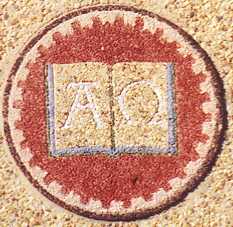
Return to
Index The Catholic Faith
Return to Level
Two Topic Index
Home Page
"You shall not take the Name of the Lord your God in vain."
The Second Commandment forbids any lack of respect or due reverence toward God in the use of his most Holy Name, or toward any holy thing. Anyone who offends God by breaking this commandment is usually spiritually unwell, since no one who truly loves God would think of purposely misusing his Name. On the contrary, someone who loves God goes out of his way to bless God's Name and to make up for the times when others misuse his Name.
When Moses asked God for his Name, God called himself "I am who am" (Ex 3:14). That's all he would say. For the Jewish people this name was so great that they would not even say it but simply called God "the Lord".
What terrible foolishness, therefore, to misuse so great a Name!

There are different ways in which people violate the Second Commandment. One way is called blasphemy. That is verbal abuse or scorn toward God himself or, by extension, the the Blessed Virgin, the saints, or holy things.
Another is by swearing false oaths. A false oath calls on God to witness to the truth of what we are saying when in fact we are lying. An oath in itself is not wrong. We may be involved in a legal proceeding which requires one. This is a good enough reason to take an oath; however, we should not take oaths invoking the divine Name without serious reason. Obviously, a false oath is a very serious sin, since we are calling God, who is all Truth and all Justice, to witness to a lie.
Aside from the formality of a legal proceeding, it is common for people to use expressions like, "As God is my witness", or, "Honest to God". Spoken seriously, these are oaths and should not be used lightly. Said thoughtlessly or for trifles, they are swearing and should be avoided. (We must not confuse swearing with using bad language or cursing; using impure language may be against the Sixth Commandment and cursing against the Fifth).
The Second Commandment also requires us to fulfill the vows and promises we have made. A vow is a solemn declaration committing oneself to do something. A vow in religion is a vow by which someone promises something for a religious reason. Religious brothers and sisters make vows of poverty, chastity, and obedience. A married couple makes a vow of fidelity.
Holy Things
We must not only respect God but must extend that respect to all those things that belong to God in a special way. We refer to our church as the house of God and a place of worship. It is a building consecrated to the glorification of God, and our behavior in church ought to express that.
All of the objects used for Mass, such as the altar, chalice, and paten, are holy because they are used in the highest form of worship. It is easy to see why we revere the Holy Bible, since it contains the word of God. And just as we treasure pictures and mementos of those we love, we also cherish crucifixes, religious medals, and pictures as reminders of God and his saints.
Certain people within the Church (the pope, bishops, priests, deacons, religious brothers and sisters) have consecrated their entire lives to God. Because they belong to God in a special way, we honor and respect them. We express our love and reverence for God in the way we treat those things and people that belong to God.
Remember what God said to Moses from the burning bush: "Moses! Moses! . . . Come no nearer. Remove the sandals from your feet, for the place where you stand is holy ground" (Ex 3:4-5).
Used with the permission of The Ignatius Press 800-799-5534
Return to
Index The Catholic Faith
Return to Level
Two Topic Index
Top
Home Page